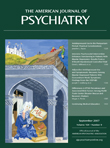Intensive Psychosocial Intervention Enhances Functioning in Patients With Bipolar Depression: Results From a 9-Month Randomized Controlled Trial
Abstract
Objective: Psychosocial interventions are effective adjuncts to pharmacotherapy in delaying recurrences of bipolar disorder; however, to date their effects on life functioning have been given little attention. In a randomized trial, the authors examined the impact of intensive psychosocial treatment plus pharmacotherapy on the functional outcomes of patients with bipolar disorder over the 9 months following a depressive episode. Method: Participants were 152 depressed outpatients with bipolar I or bipolar II disorder in the multisite Systematic Treatment Enhancement Program for Bipolar Disorder (STEP-BD) study. All patients received pharmacotherapy. Eighty-four patients were randomly assigned to intensive psychosocial intervention (30 sessions over 9 months of interpersonal and social rhythm therapy, cognitive behavior therapy [CBT], or family-focused therapy), and 68 patients were randomly assigned to collaborative care (a 3-session psychoeducational treatment). Independent evaluators rated the four subscales of the Longitudinal Interval Follow-Up Evaluation–Range of Impaired Functioning Tool (LIFE-RIFT) (relationships, satisfaction with activities, work/role functioning, and recreational activities) through structured interviews given at baseline and every 3 months over a 9-month period. Results: Patients in intensive psychotherapy had better total functioning, relationship functioning, and life satisfaction scores over 9 months than patients in collaborative care, even after pretreatment functioning and concurrent depression scores were covaried. No effects of psychosocial intervention were observed on work/role functioning or recreation scores during this 9-month period. Conclusions: Intensive psychosocial treatment enhances relationship functioning and life satisfaction among patients with bipolar disorder. Alternate interventions focused on the specific cognitive deficits of individuals with bipolar disorder may be necessary to enhance vocational functioning after a depressive episode.



